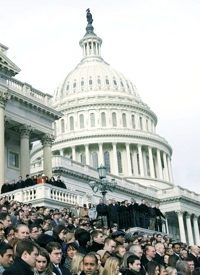
Today’s scheduled healthcare repeal vote was postponed in the House of Representatives immediately following Saturday’s shootings that killed six and left Congresswoman Gabrielle Giffords hospitalized with critical injuries. Some are wondering, however, whether Saturday’s shooting — said to be inspired by anger over healthcare and illegal immigration — will change the debate over the healthcare repeal.
Within the first few days of the 112th Congress, House Speaker John Boehner declared:
The job killing health care law was passed over the objections of the American people, and they have continued to speak out against it, loudly and clearly. With this vote, we have begun to make Washington listen and heed the voice of the people.
In response to Boehner’s assertions, Democratic Whip Steny Hoyer of Maryland indicated that the repeal effort would mark a return of the worst insurance company abuses that would explode the federal deficit.
In the days following the shootings, Representative Chellie Pingree called upon Republicans to change the name of the Repeal the Job Killing Health Care Law Act in recognition that in this environment and at this moment in our nations history, its not the message we should be sending.
Likewise, the far-left media has attributed the Arizona shooters motivations to the alleged climate of anti-government populism. The Slate compared Saturdays events to the Oklahoma City bombing in 1995:
Then it was focused on “government bureaucrats” and the ATF. This time it has been more about Obama’s birth certificate and health care reform. In either case, it expresses the dangerous idea that the federal government lacks valid authority. It is this, rather than violent rhetoric per se, that is the most dangerous aspect of right-wing extremism.
The Slate then went on to discuss the potential mental psychoses plaguing killer Jared Loughner, and used the opportunity to take a jab at the GOP healthcare repeal effort:
I don’t know if Loughner had health insurance, but he falls into a pool of people who often go uninsured not young enough to be covered by parents (until the health care bills coverage of twentysomethings kicked in a few months ago), not old enough for Medicare, not poor enough for Medicaid. If such a person happens to have a history of mental illness, he will be effectively uninsurable. To get treatment, he actually has to commit a crime. If Republicans succeed in repealing the Obama health care bill, that’s how it will remain.
As Republicans such as Representative Peter King are already proving to kowtow to pressures from the Left following Saturdays shooting on the issue of gun control by introducing legislation that would make it illegal to carry a firearm within 1,000 feet of government officials, some wonder if the Republican opposition to the healthcare law will waver as well in light of recent events.
Representative Michael C. Burgess of Texas, a physician and vice chairman of the Energy and Commerce Subcommittee on Health and strict critic of the healthcare law, indicates it will not. There will be a time of introspection,” he observed. “We should always be mindful that were in the peoples House. We are required to do the peoples business.
However, Democrat Peter Welch comments, I expect it will change no ones vote. I hope it will change everyone’s tone. My expectation is that the tone of the debate will be modulated, but we will not be any less passionate. I hope we will tone down the ad hominem attacks and the personal attacks on the people we disagree with.
According to a January 8 Rasmussen Report poll, support for repeal of the health care law remains high, as does the belief that the measure will be repealed. Fifty-four percent of likely voters favor repeal of the law, with 44 percent strongly in favor of the repeal. Whats worse for Democrats is that support of a repeal rests at 62 percent amongst voters who have discussed the healthcare law with a doctor, nurse, or healthcare professional.
Furthermore, 49 percent of voters believe that the law will eventually be overturned.
While the latest figures represent a dip from last week, when a full 60 percent of likely voters indicated support for a legislative repeal of the law, Rasmussen reports that support for the repeal has fluctuated often between 50 percent and 63 percent.
In the meantime, the House of Representatives rescheduled the healthcare repeal vote to take place some time next week.
Photo: Members of Congress and staff members gather to observe a moment of silence for Rep. Gabrielle Giffords, D-Ariz., and other shooting victims, Monday, Jan. 10, 2011, on the East Steps of the Capitol on Capitol Hill in Washington.: AP Images




